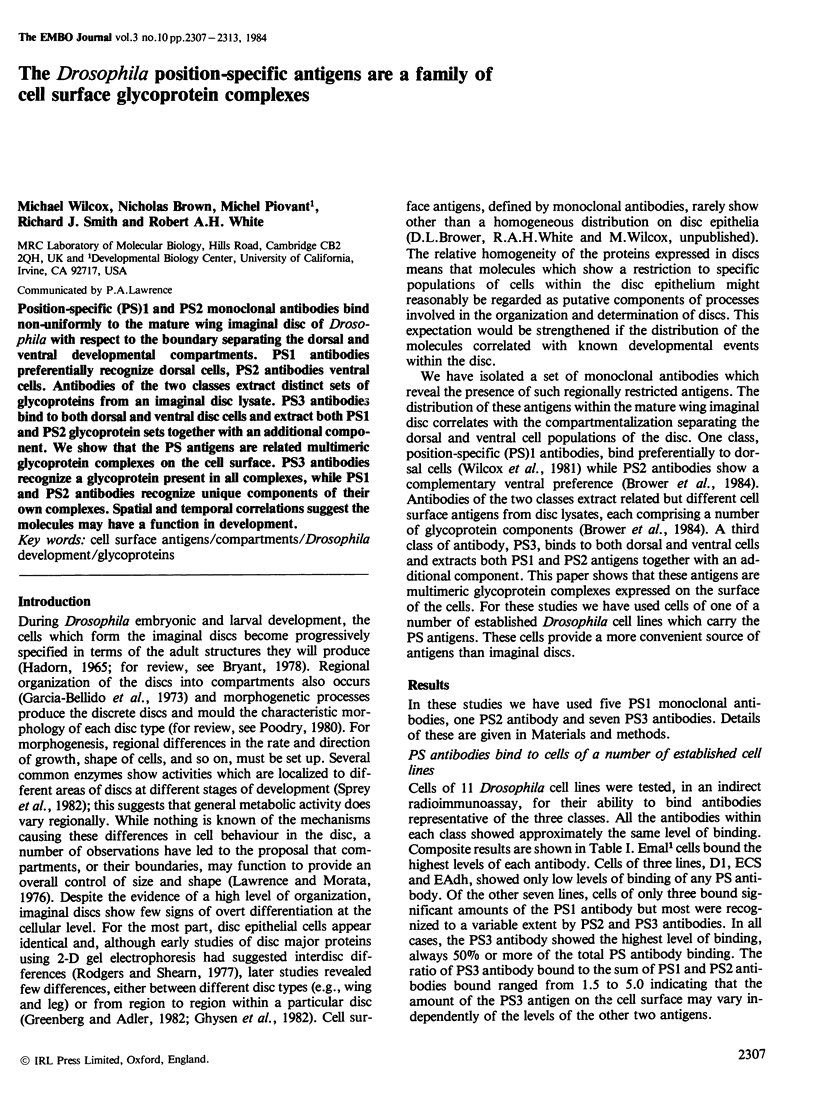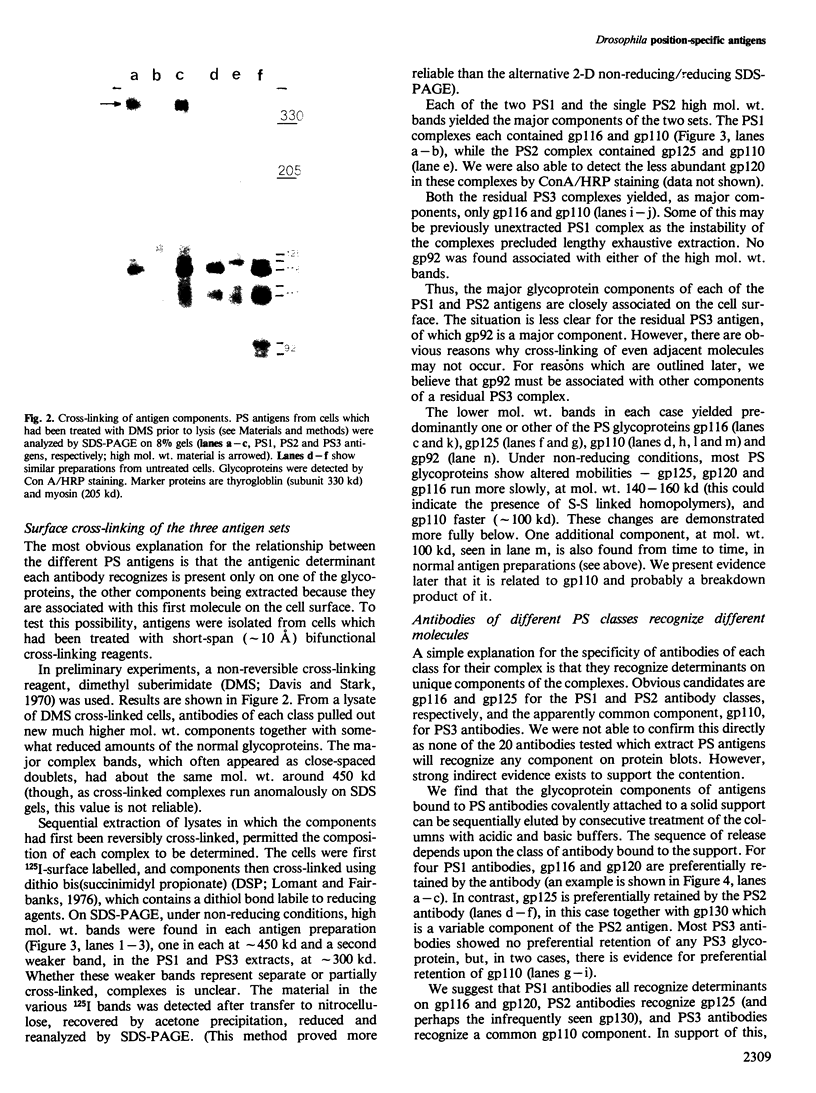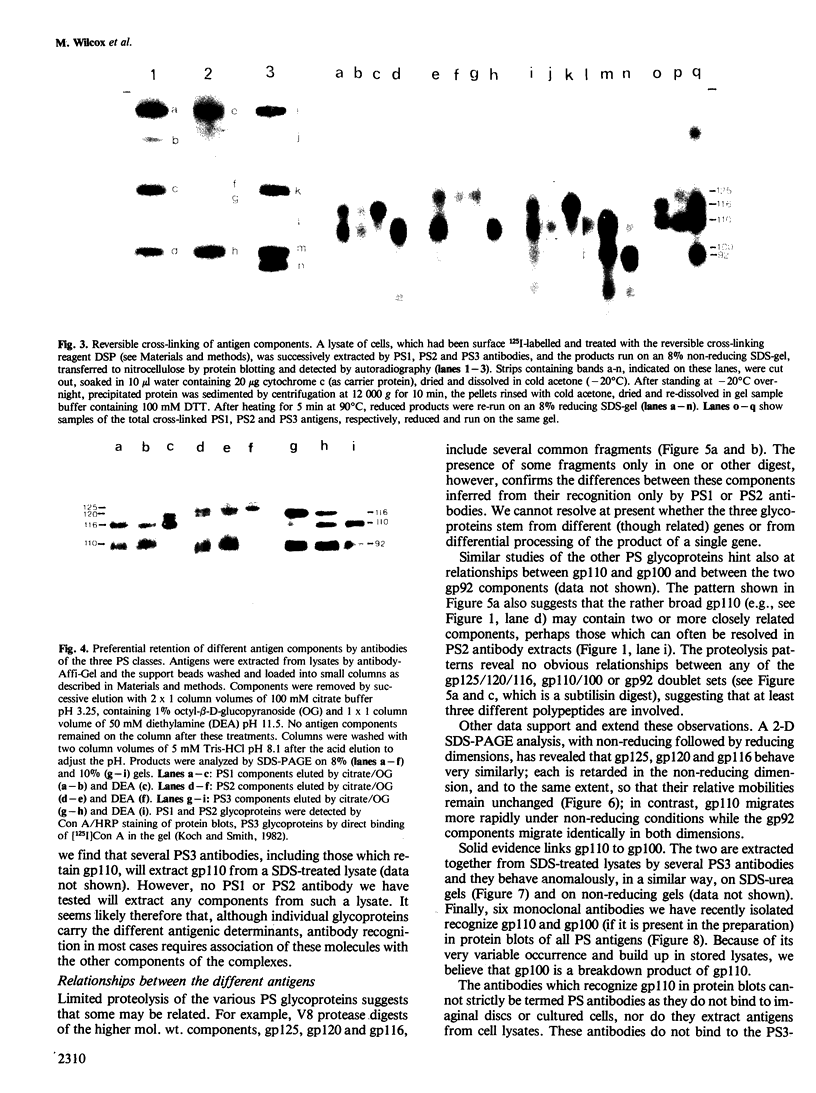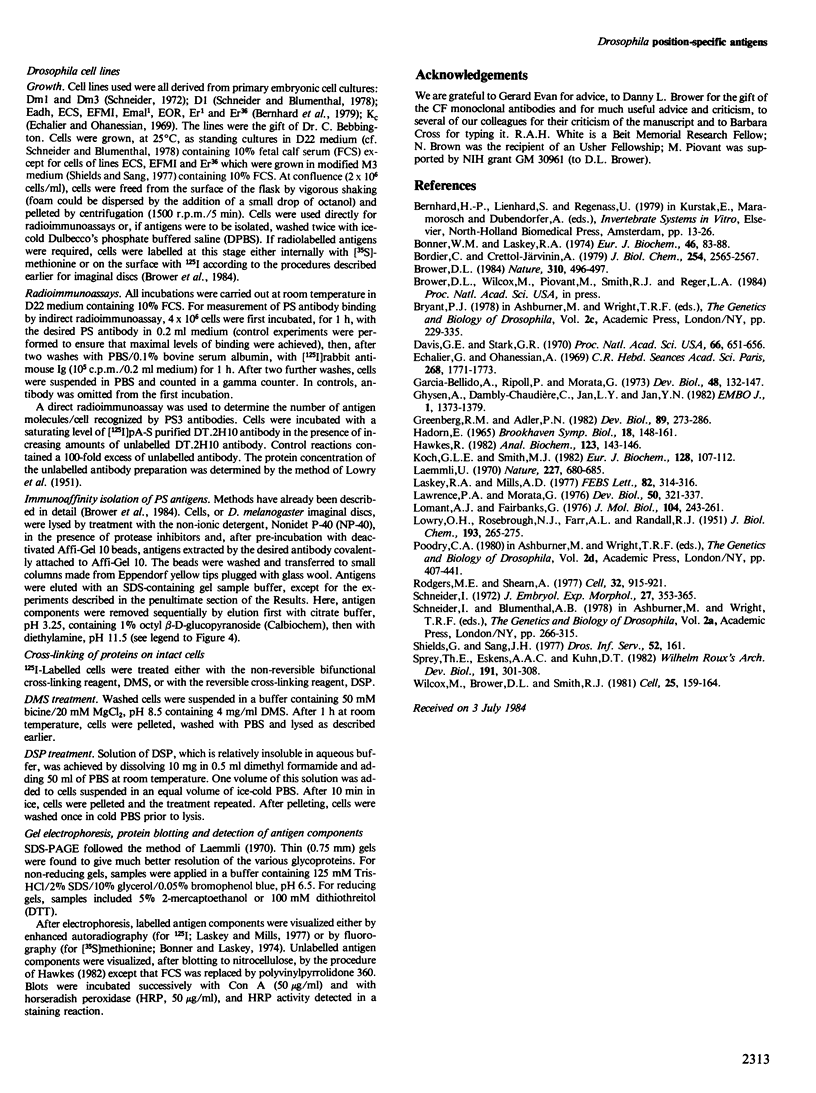Abstract
Position-specific (PS)1 and PS2 monoclonal antibodies bind non-uniformly to the mature wing imaginal disc of Drosophila with respect to the boundary separating the dorsal and ventral developmental compartments. PS1 antibodies preferentially recognize dorsal cells, PS2 antibodies ventral cells. Antibodies of the two classes extract distinct sets of glycoproteins from an imaginal disc lysate. PS3 antibodies bind to both dorsal and ventral disc cells and extract both PS1 and PS2 glycoprotein sets together with an additional component. We show that the PS antigens are related multimeric glycoprotein complexes on the cell surface. PS3 antibodies recognize a glycoprotein present in all complexes, while PS1 and PS2 antibodies recognize unique components of their own complexes. Spatial and temporal correlations suggest the molecules may have a function in development.
Full text
PDF






Images in this article
Selected References
These references are in PubMed. This may not be the complete list of references from this article.
- Bonner W. M., Laskey R. A. A film detection method for tritium-labelled proteins and nucleic acids in polyacrylamide gels. Eur J Biochem. 1974 Jul 1;46(1):83–88. doi: 10.1111/j.1432-1033.1974.tb03599.x. [DOI] [PubMed] [Google Scholar]
- Bordier C., Crettol-Järvinen A. Peptide mapping of heterogeneous protein samples. J Biol Chem. 1979 Apr 25;254(8):2565–2567. [PubMed] [Google Scholar]
- Brower D. L. Posterior-to-anterior transformation in engrailed wing imaginal disks of Drosophila. Nature. 1984 Aug 9;310(5977):496–497. doi: 10.1038/310496a0. [DOI] [PubMed] [Google Scholar]
- Davies G. E., Stark G. R. Use of dimethyl suberimidate, a cross-linking reagent, in studying the subunit structure of oligomeric proteins. Proc Natl Acad Sci U S A. 1970 Jul;66(3):651–656. doi: 10.1073/pnas.66.3.651. [DOI] [PMC free article] [PubMed] [Google Scholar]
- Echalier G., Ohanessian A. Isolement, en cultures in vitro, de lignées cellulaires diploïdes de Drosophila melanogaster. C R Acad Sci Hebd Seances Acad Sci D. 1969 Mar 31;268(13):1771–1773. [PubMed] [Google Scholar]
- Garcia-Bellido A., Ripoll P., Morata G. Developmental compartmentalization in the dorsal mesothoracic disc of Drosophila. Dev Biol. 1976 Jan;48(1):132–147. doi: 10.1016/0012-1606(76)90052-x. [DOI] [PubMed] [Google Scholar]
- Ghysen A., Dambly-Chaudière C., Jan L. Y., Jan Y. N. Segmental differences in the protein content of Drosophila imaginal discs. EMBO J. 1982;1(11):1373–1379. doi: 10.1002/j.1460-2075.1982.tb01325.x. [DOI] [PMC free article] [PubMed] [Google Scholar]
- Greenberg R. M., Adler P. N. Protein synthesis and accumulation in Drosophila melanogaster imaginal discs: identification of a protein with a nonrandom spatial distribution. Dev Biol. 1982 Feb;89(2):273–286. doi: 10.1016/0012-1606(82)90316-5. [DOI] [PubMed] [Google Scholar]
- Hawkes R. Identification of concanavalin A-binding proteins after sodium dodecyl sulfate--gel electrophoresis and protein blotting. Anal Biochem. 1982 Jun;123(1):143–146. doi: 10.1016/0003-2697(82)90634-0. [DOI] [PubMed] [Google Scholar]
- Koch G. L., Smith M. J. Analysis of the glycoproteins of murine tumour cell lines with 125I-concanavalin A in two-dimensional electrophoresis gels. Eur J Biochem. 1982 Nov;128(1):107–112. doi: 10.1111/j.1432-1033.1982.tb06939.x. [DOI] [PubMed] [Google Scholar]
- LOWRY O. H., ROSEBROUGH N. J., FARR A. L., RANDALL R. J. Protein measurement with the Folin phenol reagent. J Biol Chem. 1951 Nov;193(1):265–275. [PubMed] [Google Scholar]
- Laemmli U. K. Cleavage of structural proteins during the assembly of the head of bacteriophage T4. Nature. 1970 Aug 15;227(5259):680–685. doi: 10.1038/227680a0. [DOI] [PubMed] [Google Scholar]
- Laskey R. A., Mills A. D. Enhanced autoradiographic detection of 32P and 125I using intensifying screens and hypersensitized film. FEBS Lett. 1977 Oct 15;82(2):314–316. doi: 10.1016/0014-5793(77)80609-1. [DOI] [PubMed] [Google Scholar]
- Lawrence P. A., Morata G. Compartments in the wing of Drosophila: a study of the engrailed gene. Dev Biol. 1976 Jun;50(2):321–337. doi: 10.1016/0012-1606(76)90155-x. [DOI] [PubMed] [Google Scholar]
- Lomant A. J., Fairbanks G. Chemical probes of extended biological structures: synthesis and properties of the cleavable protein cross-linking reagent [35S]dithiobis(succinimidyl propionate). J Mol Biol. 1976 Jun 14;104(1):243–261. doi: 10.1016/0022-2836(76)90011-5. [DOI] [PubMed] [Google Scholar]
- Rodgers M. E., Shearn A. Patterns of protein synthesis in imaginal discs of Drosophila melanogaster. Cell. 1977 Dec;12(4):915–921. doi: 10.1016/0092-8674(77)90155-6. [DOI] [PubMed] [Google Scholar]
- Schneider I. Cell lines derived from late embryonic stages of Drosophila melanogaster. J Embryol Exp Morphol. 1972 Apr;27(2):353–365. [PubMed] [Google Scholar]
- Wilcox M., Brower D. L., Smith R. J. A position-specific cell surface antigen in the drosophila wing imaginal disc. Cell. 1981 Jul;25(1):159–164. doi: 10.1016/0092-8674(81)90240-3. [DOI] [PubMed] [Google Scholar]









